87th Battalion (Canadian Grenadier Guards), CEF
The 87th Battalion (Canadian Grenadier Guards), CEF was a Household Foot Guards infantry unit in the Canadian Expeditionary Force during the First World War. Based in Montreal, Quebec, the unit was authorized on September 15, 1915, as an exclusively Canadian Grenadier Guards (CGG) formation with Guards uniforms and accoutrements approved by The Governor General of Canada, HRH, Duke of Connaught (Colonel of the Canadian Grenadier Guards). Mobilization and recruiting for soldiers began on October 23, 1915.
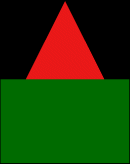
More than 4,213 men served in the 87th Battalion, representing all regions of Canada, but predominantly Ontario, until the last few months of the war when the balance was furnished by soldiers from Quebec (included the need to form a francophone company) The battalion earned 17 battle honours at a cost of 886 dead and 2,246 wounded, many of them wounded multiple times.
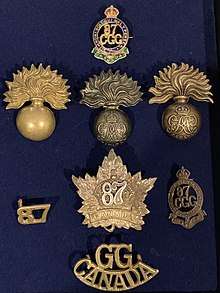
Unit distinctions & achievements
The 87th Battalion (Canadian Grenadier Guards) CEF holds several distinctions in compared to other CEF battalions:
- CGG was one of only 7 Militia Regiments (out of 51 CEF units) to recruit their own battalions that fought as a distinct unit within the Canadian Corps.
- The 87th Battalion was one of only 3 Canadian units authorized by the Minister of Militia, Sir Sam Hughes, to recruit across all of Canada. The other 2 were the Royal Canadian Regiment and Princess Patricia's Canadian Light Infantry.
- The 87th Battalion was the only Canadian Foot Guards CEF unit active during The Great War. The Governor Generals Foot Guards (GGFG) contributed volunteers for the 2nd Battalion (Eastern Ontario Regiment), CEF, and the 77th Battalion CEF (Ottawa), CEF. The Governor Generals Horse Guards (GGHG) contributed men for the 4th and 7th Canadian Mounted Rifles (Bantams) CEF, but these were composite or regional units (more on that later) and none bore the title or accoutrements of Guards.
- Title of 'Guardsman' was awarded by King George V in 1919 as a permanent distinction in conjunction with all other Guards units, in recognition of their collective contributions to victory in the Great War.
- 87th Battalion were the first to liberate Belgium on 5 November 1918. Patrols from the 87th Battalion (Canadian Grenadier Guards), of the 4th Division, crossed the River Aunelle, thereby marking the liberation, by the Canadians, of the first part of occupied Belgium.
- The 87th Battalion had within its ranks 4 members who Founded/Formed CEF Battalions during WWI: BGen Frank S. Meighen (14th and 87th Bns); Col. Hercule Barre (150th Bn) ; Maj. Olivar F-J. Asselin (163rd Bn); and LCol J. V. O'Donahoe, (199th Bn)
Unit milestones
Mobilization and England
The 87th Battalion departed Canada after boarding R.M.S. Empress of Britain on April 23, 1916 and arrived in Liverpool, England on May 5, 1916. The battalion arrived and billeted on May 27 at Bramshott Military Camp as part of the 12th Infantry Brigade (until June 1916) and then designated as part of the 11th Infantry Brigade of the 4th Canadian Infantry Division in August of the same year. During the period in England, the battalion received training from an officer and four drill sergeants from the British Grenadier Guards, all trench veterans, all previously wounded in action (WIA). On August 11/12, the battalion crossed over to France and landed at Le Havre, France on August 13, 1916 with a total strength of 1,090 all ranks. The battalion served the duration of the war as part of the 11th Infantry Brigade, 4th Canadian Infantry Division.
First Actions & casualties
Following the Battle of Mont Sorrel, 303 members of the 87th Battalion were detached to reinforce the 1st Battalion (Ontario Regiment), CEF. Of these CGG members, two, 177281 Private John Leitch, (later KIA 9 April 1917), and 178218 Private William Anson Ogilvie, would distinguish themselves with the 1st Battalion during the Battle of the Somme and win multiple Military Medals for bravery in the field. The initial loss of men were replaced by 391 officers & men from the 77th, Battalion, (Ottawa) CEF, from the GGFG. The battalion was introduced and indoctrinated into trench warfare beginning August 18, 1916 in the Ypres area. Their first casualties, two wounded, occurred that same day. The first 87th Battalion fatality occurred on August 26, 1916. Total casualties for the first weeks of the war were eventually 17 KIA / 25 WIA. On September 16, 1916, the 87th battalion participated in their first trench raid resulting in 36 casualties out of 60 engaged unit members.
Battle of the Somme
On 10 October 1916, the 87th Battalion was relocated to Albert area along the Ancre area and on the 21 October, attacked and took a section of Regina Trench. The first gallantry awards earned by the 87th Battalion were awarded to four members for the attack on Regina Trench, CSM W. Blaney, Sgt. J.C. Noon, Ptes J.E. Blaney, and J.D. Hunter. After some routine activities and tours along the front, on November 18, the 87th Battalion was assigned to capture a section of Desire Trench, as well as its support systems. The attack was launched from Regina Trench. It succeeded well beyond expectations, and in addition to capturing Desire, Major Franklin Hall, with 41 volunteers, with only their rifles, bayonets, grenades and 2 Lewis Guns advanced a further 500 yards and captured part of Grandcourt Trench, including taking 115 prisoners. 80 of these were taken unaided by four privates; Roy, Thompson, Garneau and Winke.
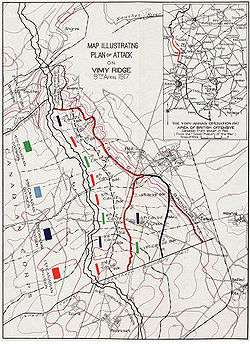
Battle of Vimy Ridge
The Battle of Vimy Ridge was a gallant yet terrible tragedy for the battalion. One Military Cross (MC), 14 Military Medals(MM), and 1 Mentioned in Dispatches (MID) were awarded to members of the 87th Bn. Total casualties for the Battle were 315 all ranks out of an attacking force of 520 (60.6%). 10 of the 11 officers who led the first wave, were casualties.[1]
"The 4th Canadian Division's principal objective was Hill 145, the highest and most important feature of the whole Ridge. Once taken, its summit would give the Canadians a commanding view of German rearward defences. Because of its importance, the Germans had fortified Hill 145 with well-wired trenches and a series of deep dug-outs beneath its rear slope. The brigades of the 4th Division were hampered by fire from the Pimple, the other prominent height, which inflicted costly losses on the advancing waves of infantry."[2]
From the start of the battle, progress on the right was slow because, for a time, the centre had practically collapsed. The 87th Battalion (Canadian Grenadier Guards) were in the first wave but for some reason, a section of enemy trench barely a hundred metres in front of them had been left untouched by the artillery bombardment. Subsequently, the lead assault company was virtually wiped out within the first few minutes. This caused a delay of the other guardsmen so that they lost the barrage, and those who tried to continue the advance were cut down by German machine gunners firing from positions of relative safety in the untouched trenches.
"The 87th Battalion War diaries reports that six of the seven officers leading the 87th into battle were killed or wounded within the first hours. "Word had been received that Captain Harry Sare, MID (Officer Commanding the Assault), had been shot through the head with a bullet and could no longer carry on. Lieutenant Yonkles had also been hit in the left arm, Majors Joy and Ross and Lieut. Savage had been killed, and Lieut. Sinclair badly wounded, leaving Lieutenant Hannaford the only available officer of those who went over." The 87th Battalion first day casualties for April 9th at Vimy Ridge were 7 officers & 149 men killed; 4 officers and 155 men wounded with most having occurred have occurred within the first few minutes of the battle.
Officers Commanding
- Lieut.-Col. F.S. Meighen (September 20, 1915 to March 29, 1916)
- Lieut.-Col. J. P. Rexford (March 27, 1916 to August 1, 1916)
- Lieut.-Col. R. W. Frost, DSO (August 2, 1916 to April 6, 1917)
- Major H. LeR. Shaw (April 7, 1917 to May 7, 1917)
- Lieut.-Col. J. V. P. O'Donahoe, DSO (May 8, 1917 to April 5, 1918)
- Major J. S. Ralston, MC (April 6, 1918 to May 14, 1918)
- Lieut.-Col. K. M. Perry, DSO and Bar (May 15, 1918 to September 10, 1918), one of only 92 Canadians of the CEF to be awarded a 2nd DSO
- Lieut.-Col. F. S. Meighen, CMG (October 14, 1918 to March 7, 1919)
- Lieut.-Col. R. Bickerdike, DSO and Bar (March 7, 191, until demobilization), one of only 92 Canadians of the CEF to be awarded a 2nd DSO
Battle honours
- Somme 1916
- Ancre Heights
- Ancre, 1916
- Arras, 1917 & 1918
- Vimy, 1917
- Hill 70
- Ypres, 1915
- Passchendaele, 1917
- Amiens, 1918
- Scarpe, 1918
- Drocourt-Queant
- Hindenburg Line
- Canal du Nord
- Valenciennes
- Sambre
- France and Flanders, 1916–18
Victoria Cross Awards
Private John Francis Young
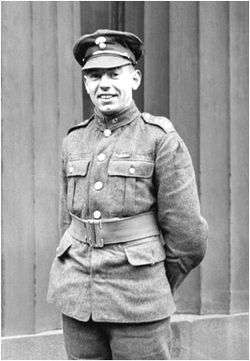
The award of the VC was announced in the London Gazette on December 14, 1918. Private Young was in Kidderminster, England at the time and received the decoration from King George V at Buckingham Palace in April 1919. That month, he married Ida May Thatcher at St. Mary’s Church in Kidderminster. He took his bride back to Canada dying in 1929.
Commemorations / Plaques honouring John Francis Young, VC
Montreal, Canada: A tribute plaque in front of Sergeant Young's Heads Stone in Mount Royal Cemetery was unveiled by The Canadian Grenadier Guards. The Canadian Grenadier Guards' Junior Ranks Mess is named the "John Francis Young Club" in his honour. Past and present serving members of The Canadian Grenadier Guards are required to execute a proper halt, come to attention, each time entering the Jr. Ranks Mess. There is a memorial plaque to him in the CGG Sergeants' mess.
Kidderminster, England: The dedication of a new road name and a paving stone in J.F. Young's memory was unveiled by the Wyre Forest District Council. The ceremony in front took place outside St Mary’s and All Saints Church in Kidderminster on September 3rd, 2018. The ceremony was attended by local dignitaries and veterans’ organisations as well as representatives of the Canadian High Commission and the Canadian Grenadier Guards.
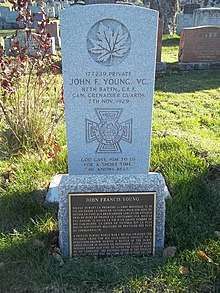
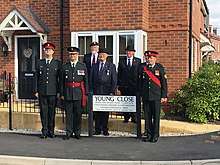
Gallantry Awards
The following summarizes additional awards earned and gazetted to members while serving with the 87th Battalion (Canadian Grenadier Guards) CEF.
- Knight Bachelor : 1
- Companion of the Order of the Bath : 1
- Companion of the Order of St. Michael and St. George: 3
- Distinguished Service Order and Bar: 3
- Distinguished Service Order: 9
- Officer of the Order of the British Empire: 2
- Member of the Order of the British Empire: 1
- Distinguished Flying Cross and Bar: 1
- Distinguished Flying Cross: 2
- Military Cross and Bar: 5
- Military Cross: 49
- Distinguished Conduct Medal: 20
- Meritorious Service Medal: 12
- Military Medal and Bar: 14
- Military Medal: 168
- Mentioned in Dispatches: 40
Notable members
- Lieutenant Samuel Lewis Honey, VC, served with 87th Bn in 1916 prior to being transferred to 78th Bn CEF
- Major-General Frederick Ross Phelan, CB, DSO, CStJ, MC, VD - Director-General Reserve Army
- Brigadier General Marcel Noel, CBE, ED, Vice Adjutant-General, National Defence Headquarters
- Lieutenant Colonel Maurice Alexander, CMG, KC - Famous Canadian Lawyer, Judge Advocate General and highest ranking Jewish Officer in the CEF.
- Lieutenant Colonel Hercule Barré, LoH, CDG - Founder of 150th Battalion CEF
- Major Gilbert Sutherland Stairs, MC - Lawyer - Rhodes Scholar, Harvard Law School
- Major John S. Lewis, Editor of The Montreal Star (KIA November 18th, 1916)
- Major Olivar Joseph-Francois Asselin - Famous Quebec Journalist, philanthropist, Newspaper owner (Le Droit), Quebec Politician, past president of Le Société Saint-Jean-Baptisteand, and founder and sponsor of the 163rd "Poil-aux-Pattes" Battalion CEF
- [3]Major Howard Frank Fogg, Musical Pioneer and Canadian Composer, credited with writing the first original composition for a Canadian film.
- Major Gordon Lewis, No2 Coy Commander, Hockey Player, Won Stanley Cup with Montreal Victorias 1896
- Art Ross, Coach The Canadian Grenadier Guards Hockey Club (1915), Canadian professional ice hockey player
- Captain Henry Scott, Son of Canon Frederick George Scott
- Captain Alfred Craig Hannaford, MC and Bar, (one of only 294 Canadians in the CEF)
- Captain William Stanley Jenkins, DFC and Bar, Canadian Ace with 13 confirmed aerial victories
- Lt. Charles Douglas Spittal, Hockey Player, won Stanley Cup with Ottawa Sevens in 1903
- Lieutenant / Sgt Alexander McClintock, DCM, Author "Best o' luck; how a fighting Kentuckian won the thanks of Britain's king", published 1917
- Lieutenant Jimmy Montgomerie, Professional Football Player, Canadian Sports Hall of Fame
- Private William Anson Olgilvie, MM and 2 Bars (One of only 38 Canadians to win 3 MMs)
- Private Stewart Dobbs Whiteford, Founding member of The Canadian War Amps
- Private Albert Nightingale Withey, DCM
- Private Maynard Stansfield - Son of MP Joshua Stansfield[4]
Memorials
Christ Church Cathedral - Montreal Canada. The Cathedral is the regimental church of the Canadian Grenadier Guards and houses The Guards' retired regimental colours.
87th Battalion Vimy Cross CGG Armoury, Montreal Canada - Unveiled on 16 September 1917 by Major general Sir David Watson. The memorial was constructed by Pioneer Sgt C.G. Durrant and bears the names of 217 of the 87th Battalion who were killed or died of wounds during the period of February 1 to June 30, 1917.
Canadian National Vimy Memorial - (1936) Inscribed on the outside wall of the monument are the names of the 11,285 Canadians killed in France whose final resting place is unknown. King Edward VIII unveiled it on 26 July 1936 in the presence of French President Albert Lebrun and a crowd of over 50,000 people, including 6,200 attendees from Canada. Following an extensive multi-year restoration, Queen Elizabeth II re-dedicated the monument on 9 April 2007 at a ceremony commemorating the 90th anniversary of the battle. 18 original 87th Battalion (CGG) members participated in the 1936 Vimy Ridge pilgrimage. Approximately 22 members of The Canadian Grenadier Guards (and associates) attended the 100th Anniversary in 2017. The 18 CGG Members who participated in the 1936 Vimy Ridge Pilgrimage: Alfred E Bailey, James Boon, James M Dever, Frederick Guthrie, Arthur J Hill, Alfred H Jackson, George A McGee, Thomas A Parkinson, Arthur E Parsons, William Reid, Major Henry H Rolland, Edmund Round, Herbert H Sheel, F.W. Skeates, Dr. Even A. Stewart, Wilfred G. Symons, and Clyde T. Wilson.
87th Battalion Panel - Menin Gate Ypres. The memorial is a covered archway with a bridge over the moat that surrounds the city. Inside, and on the stairwells on either side, there are panels for the names of the 56,000 soldiers, approximately 6,983 Canadians, without known graves. When the memorial was inaugurated in 1926 the Brigadier who gave the opening speech addressed those that had no grave to mourn and said “he is not missing, he is here”
Two German Field Guns - the First World War Memorial Site on the Plains of Abraham, Plains of Abraham, Quebec City, QC - (2019) - Two 7.7cm Field guns captured by the 87th Battalion (Canadian Grenadier Guards) on September 27th, 1918 southwest of Bourlon during the Battle of the Canal-du-Nord and Cambria. with dedication plaque were unveiled as a collection of 7 artillery pieces captured by the 13th (one) and 42nd (two) Bns (perpetuated by the Royal Highlanders of Canada, 22nd Bn (one) perpetuated by the Royale 22e Regiment, and the 87th (two) perpetuated by CGG, and the 60th Bn (one) perpetuated by The Victoria Rifles of Canada. The site was dedicated on Remembrance Day, 11th November, 2019.

Alter Frontal - St Paul's Cathedral, London, England - (1919) - The Frontal was used for the first time on Sunday 6 July 1919, at the national service of thanksgiving for peace at the end of the war in the presence of the King and Queen and many of the 138 soldiers from the UK, Canada, South Africa and Australia who had made it. Pte Edward Hodder represented the 87th Battalion (CGG).
Memorial Brass Tablet - Cathedral of the Holy Trinity, Quebec City, Canada - (1935) - In memory of Lieutenant James William Williams, son of Lennox Waldron Williams, Bishop of Quebec. Lt. Williams was killed on November, 18th, 1916 during the Battle of the Somme.
Memorial Window - Chapel, Montreal Diocesan Theological College, Montreal, Canada' - (1935) - Memorial stained glass windows created by Charles William Kelsey. The window remembers Albert Withney, D.C.M. who was killed in Amiens on the 8th of August, 1918
Bell Telephone Company Memorial Plaque, Montreal, Canada - (1929) - Bell Canada Building at 1050, Côte du Beaver-Hall, Montréal. The Memortial is flanked by the logo of the Bell Telephone Company of Canada. The Memorial celebrates four 87th Bn Canadian Grenadier Guards members - Captain Harry Sare, 177252 Pte J.C. MacFarlane, 177199 Pte W.N. Rumsey, and 177277 Pte W.J. Simmons.
Concordia University Road of Remembrance, Montreal West, Canada - (1922) - 37 trees are planted in as a “Road of Remembrance” for the 37 graduates of Loyola College who fought and died during World War 1. One of 37 trees is dedicated to the memory of a Canadian Grenadier Guards Alumni of Loyola College who fell in 1915.
McGill University Book of Remembrance, Montreal, Canada - (1926) - McGill University commissioned the first book of Remembrance, known as the McGill Honour Roll, listing the names of close to 400 staff, student and faculty who lost their lives during the First World War. A total of 26 Members of The Canadian Grenadier Guards are remembered, biographic, and highlighted.
Royal Bank of Canada, Montreal, Canada - (1928) - The Royal Bank of Canada built its new headquarters at 360 St James St W in 1928 (the tallest building in the British Empire at the time), the bank honoured its employees who had died in World War One. The names of 4 Canadian Grenadier Guards are remembered. Pte L. Porter, Sergeant A.S. Hill, L/Cpl J. Glass, and Pte L.V. Garneau (M.M.).
Bank of Montreal - The Honour Roll of the Members, Montreal, Canada - (1928) - The Bank of Montreal is the oldest bank in Canada (founded in 1817). The Montreal main branch at 119 rue Saint-Jacques contains Tributes to the fallen employees of three banks (Bank of Montreal, The Merchants Bank of Canada, and Molsons Bank). 8 87th Battalion Canadian Grenadier Guards are remembered. (Sgt D.S. Bailey, Captain David Baker, Lt. H.Y. Carroll, Cpl F. Kennedy, Lt. C.G. Laberee, Captain J.R. Wallace MID, Pte A.E. Olding, and Captain Errol Y. Hall).
Port Hope Cenotaph and The Honour Roll, Port Hope, Ontario, Canada - (1926) - The granite cenotaph was originally erected in 1926 by the Col. Arthur Williams Chapter of the Imperial Order Daughters of the Empire (I.O.D.E.). On the front are inscribed the names of the local men who died in the Great War and remembers 8 Canadian Grenadier Guards who were KIA while part of the 87th Bn. (Pte F. Arkless, Pte C Clark, Pte A.R. Currie, Pte L.T. Godman, Pte D.J.C. Hinton, Pte J. Johnston, Pte W.N. Lownie, Pte C.H. Staples)
Lt. S.G. Hobday, DCM family Brass Plaque, St Michael the Archangel Church, East Sussex, England - (1919) - The brass plaque memorializes Lt. S.G. Hobday (who served with the Canadian Grenadier Guards and won a DCM) and his brother.[5]
See also
References
- Soldiers Of The Queen The Canadian Grenadier Guards 1859-2009, BGen (retired) William J. Patterson, OMM, CD
- https://www.veterans.gc.ca/eng/remembrance/history/first-world-war/road-to-vimy-ridge/vimy5
- Library and Archives of Canada Bac-Lac
- https://www.veterans.gc.ca/eng/remembrance/memorials/canadian-virtual-war-memorial/detail/235407
- https://www.iwm.org.uk/memorials/item/memorial/17065
- Over the Top! The Canadian Infantry in the First World War. Meek, John F. , Ont.: The Author, 1971.
- History of the Canadian Grenadier Guards, Colonel A Fortescue Duguid, DSO, BSc, RCA, 1965, The Gazette Publishing Company
- Soldiers of the Queen The Canadian Grenadier Guards of Montreal 1859-2009, Patterson, William J. BGEN(retired), 2009, Canadian Grenadier Guards Corporations
- Best o' luck; how a fighting Kentuckian won the thanks of Britain's king, Alexander McClintock, D.C.M., 1917, New York : George H. Doran company
- The 87th. Battalion (Canadian Grenadier Guards) Canadian Expeditionary Force – a very special unit. John Dolbec, 2016
- Commemorative event and service held at Silverwood’s Park St Francis Group, 2018